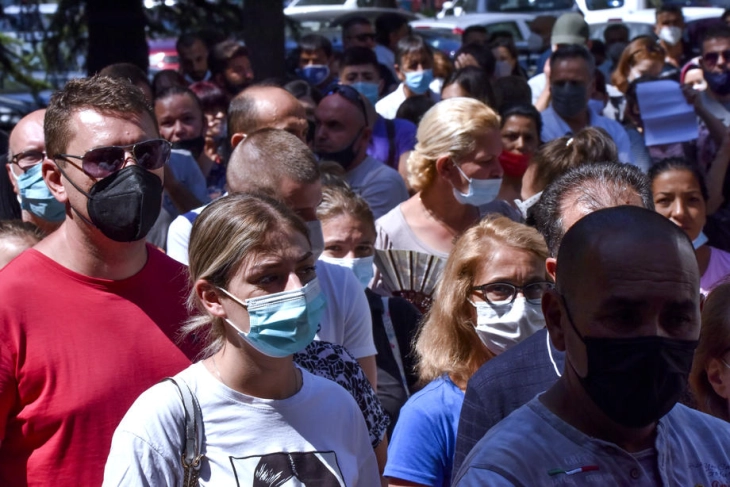Covid-19 cases in most Balkan countries continue to rise

Sofia, 15 October 2021 (BTA/MIA) — The number of new covid-19 infections and deaths in the Balkan countries continues to vary in what is still a complicated situation.
Romania: Effective Saturday, stricter measures were imposed in Bucharest, prompted by a persistent rise in the number of covid-19 infections in the capital city, the Agerpres Agency reported. Public and private sector employers with over 50 staff will have to organize their work schedule in shifts timed at least an hour apart so as to avoid crowding.
The authorities said there was not a single vacant ICU bed in the country. On Thursday, Romania sent the first ten covid patients for treatment to Hungary as arranged with the authorities in Budapest. Hungary has agreed to handle 50 patients in serious condition.
In Bucharest, the infection rate reached 15.42 per 1,000 residents, the highest since the onset of the pandemic.
Greece: For a week now, the spread of the coronavirus in Greece has steadied at some 2,300 new cases daily. Covid fatalities, too, have leveled at some 30 daily.
Mobile vaccination teams are already visiting remote villages in Northern Greece in an attempt to increase the immunization uptake, which is the lowest compared to the rest of the country.
Cyprus: On Sunday, http://www.philenews.com reported that 81.4 percent of the country's residents have received at least one vaccine dose, and 78.9 percent aged 18 and over are fully vaccinated.
Albania: Prime Minister Edi Rama said the country was expecting 500,000 doses of the Pfizer covid-19 vaccine in mid-October and that the manufacturer would continue to supply his country with its product in 2022, https://exit.al reported on Monday.
Rama broke this news on Monday while touring a Tirana vaccination center together with Pfizer's CEO Albert Bourla, who is visiting Albania.
Although vaccination is free and accessible to all residents of the country aged 18 and over, only 833,070 Albanians have completed their vaccination course, which represents some 29 percent of Albania's 2.8 million population.
Republic of North Macedonia: Thirty-five percent of the country's population is fully vaccinated and 38 percent of them have received one dose, the MIA News Agency reported on Tuesday, quoting the Health Ministry in Skopje.
Some 75 percent of teachers are inoculated and about 2 percent of the pupils are attending classes online, the Education Ministry said.
Slovenia: Only Pfizer–Biontech and Moderna vaccines will be used in the future in Slovenia, while vector vaccines (AstraZeneca and Johnson&Johnson) will be applied in exceptional cases, according to Health Minister Janez Poklukar, Slovenian media reported.
The step follows a recommendation of a group of medical experts after a girl recently died less than fortnight after a J&J jab.
Turkey: Only 7.5 million of Turkey's 84.3 million population aren't vaccinated against covid-19, local media reported on Thursday. Experts say mainly young people ignored the constant appeals to get the jab.
A total of 7,400 had volunteered to participate in the clinical trials of Turkovac, and they will be offered a booster dose of the Turkish vaccine after two Sinovac jabs, Anadolu Agency reported. Turkish Health Minister Fahrettin Koca said this stage of the trials would begin this week.
Montenegro: A total of 879,980 doses of Pfizer, AstraZeneca, Sinopharm and Sputnik V vaccines have been administered so far. The Health Ministry said 100,000 Sinovac doses were expected. Mass vaccination in Montenegro began in May 2021.
Serbia: On Tuesday, Serbian Crisis Task Force member and epidemiologist Predrag Kon said the country was in a "grave situation," but nevertheless noted a certain stabilization of the infection rate. Speaking of the coming period of multiple holidays, he said the ban on gatherings of more than five persons had to be kept in place but stressed that the measures would not change anything without vaccination.
Health Minister Zlatibor Loncar was quoted by the Novosti newspaper as saying that the Medical Chamber would initiate proceedings against any doctor in Serbia who jeopardized public health by advising against vaccination.
Croatia: Fifty-five percent of the adult population have received a first dose of a coronavirus vaccine, and over 73 percent of health workers have been immunized, State Secretary Tomislav Dulibic said at a cabinet meeting on Thursday, quoted by the Jutarnji list daily.
The number of new infections, however, continues to rise. Deputy Prime Minister and Interior Minister Davor Bozinovic said that easing the restrictions was out of the question in the present situation.
At its latest meeting, the National Civil Protection Staff extended until Oct. 31 the country's mask-wearing mandates, limitations on gatherings and store visits, public transport rules as well as the temporary ban and restriction on crossing borders.







